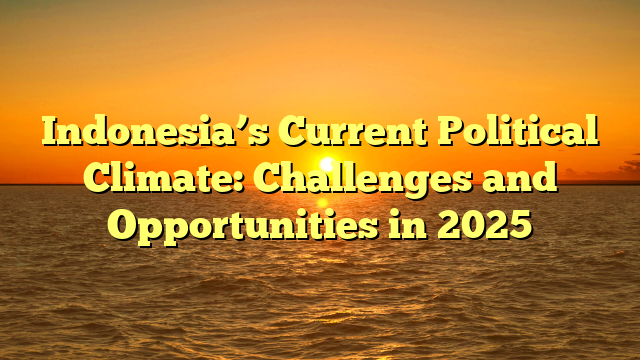Indonesia, Southeast Asia’s largest democracy, is undergoing an important political transition in 2025. With the leadership change after the 2024 general elections, the nation finds itself at a crossroads between continuity and reform. The new administration inherits both the achievements and the challenges of former President Joko Widodo’s decade-long rule, while also being tasked with addressing the growing maritim4d demands of a younger, more politically engaged population.
A major focus of current politics is economic policy. The government has promised to maintain growth momentum by expanding infrastructure projects and attracting foreign investment. Industrialization, green energy initiatives, and the continuation of Indonesia’s ambitious new capital city project in East Kalimantan remain central priorities. Yet, critics warn that these projects may benefit only certain regions, while disparities in wealth and development continue to affect rural and eastern provinces. Bridging this inequality gap is one of the most pressing tasks for the new administration.
Coalition politics also dominate the scene. Indonesia’s multi-party system makes it almost impossible for one party to govern alone, forcing leaders to build broad alliances. While coalitions encourage inclusiveness, they often result in compromises that slow policy implementation. Observers argue that the government must prove it can balance coalition interests with the need for effective and timely decision-making.
Democratic resilience is another central issue. While Indonesia is praised for its regular and peaceful elections, concerns about democratic backsliding persist. The spread of disinformation during campaigns, weakening institutions, and the influence of money in politics raise questions about the long-term strength of Indonesia’s democratic system. Civil society groups continue to push for greater transparency, accountability, and protections for freedom of expression.
Corruption remains a deeply rooted challenge. Although the Corruption Eradication Commission (KPK) was once a powerful symbol of reform, its weakened role in recent years has caused public frustration. Restoring the effectiveness of anti-corruption institutions will be critical to rebuilding trust in government and ensuring fair governance. Without meaningful reform, corruption risks undermining both economic development and public faith in democracy.
Identity politics also plays a role in shaping Indonesia’s current political climate. Religious and ethnic sentiments often influence elections and public debates. While the nation has long prided itself on diversity and pluralism, the rise of conservative movements and divisive rhetoric could deepen social polarization. The government must therefore carefully manage unity, ensuring that political competition does not harm the country’s commitment to inclusivity.
On the global stage, Indonesia continues to balance its foreign relations. As a member of the G20 and a leading country in ASEAN, it seeks to strengthen its role as a regional mediator. Its foreign policy remains non-aligned, with the government fostering ties with both Western powers and major Asian economies such as China and Japan. Issues such as climate change, maritime security, and regional trade are at the center of Indonesia’s international agenda.
Overall, Indonesia’s political situation in 2025 reflects both stability and uncertainty. The country has successfully transitioned to new leadership, but challenges related to inequality, corruption, democracy, and unity remain unresolved. The decisions made by the government in the coming years will shape not only the nation’s future but also its standing as a model of democracy in the region.
